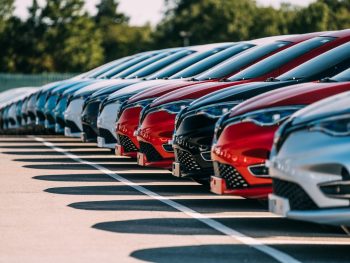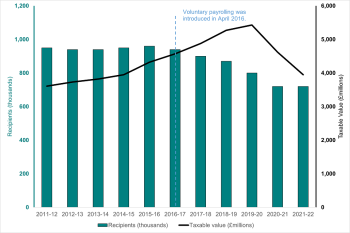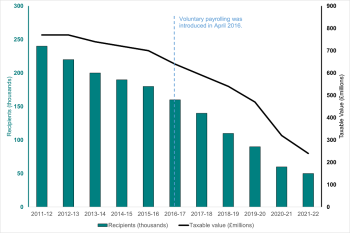HMRC data reveals continued appeal of company cars amid shift to EVs
Demand for company cars remained steady in 2021/22, ending several years of freefalling uptake, according to newly published HMRC figures.

720,000 UK employees paid company car tax in 2021/22 – the same level as in the previous year
Its latest Benefit-in-Kind statistics for company cars reveal that 720,000 UK employees paid company car tax in 2021/22 – that’s the same level as in the previous year and follows years of steady decline. Back in 2015/16, there were 960,000 drivers paying company car tax but rising tax thresholds and the diesel surcharge led to many drivers opting out and running their own private cars.
Figures published by HMRC last year for the 2020/21 tax year had shown there were 80,000 fewer company car takers, down 10% from 800,000 in the previous year. HMRC has now said that such a fall is expected to have been exacerbated by the impacts of the pandemic, and associated reduction in economic activity. It also said changes in work practices during that period may have continued into 2021/2022.
A further complication in comparisons over time is the introduction of voluntary payrolling in April 2016, which meant there was no requirement to report the details of voluntarily payrolled company cars until April 2018. This may have led to considerable unreporting; HMRC has stressed that the appropriate tax was collected but car benefit not recorded.
One key factor that has helped boost company car uptake has been the introduction of low tax ratings for low-emission cars, spearheaded in April 2020 by the 0% Benefit-in-Kind rate for fully electric cars, which moved to a 1% threshold in 2021/22 and 2% threshold from 2022/23 until 2024/25. These have proved highly attractive in luring drivers back, supported by a rapid rise in salary sacrifice schemes to enable more drivers to capitalise on low BiK.
The 2022 Autumn Statement last November also saw the Government confirm that yearly company car tax increases from 2024/25 will be capped at 1% until 2027/28 to keep rates low.
Toby Poston, director of corporate affairs at the BVRLA, welcomed the latest HMRC figures. He commented: “It is encouraging to see the slide in company car numbers has finally been arrested. We know that company-provided vehicles are cleaner, greener and safer, playing a crucial role in the UK’s decarbonisation efforts. The latest HMRC figures show the direct benefits of having a fair taxation system in place.
“The BVRLA secured more years of clarity on company car tax rates last November, giving a financial incentive to support the wider desire to ‘go green’. That will continue the trend back into company cars, helping more drivers and companies ditch their older, dirtier vehicles.”

Figure 1: Number of recipients and total taxable value of company cars (from April 2011)
Company car tax recipients from 2011/12 to 2021/22
| Year | Recipients (thousands) | Taxable value (£millions) |
| 2011/12 | 950 | 3,610 |
| 2012/13 | 940 | 3,730 |
| 2013/14 | 940 | 3,820 |
| 2014/15 | 950 | 3,950 |
| 2015/16 | 960 | 4,320 |
| 2016/17 | 940 | 4,570 |
| 2017/18 | 900 | 4,880 |
| 2018/19 | 870 | 5,270 |
| 2019/20 | 800 | 5,430 |
| 2020/21 | 720 | 4,620 |
| 2021/22 | 720 | 3,950 |
Falling tax take as drivers go electric
HMRC’s new (and provisional) figures also reinforce how attractive tax rates for low- and zero-emission cars are cutting the Government’s tax take.
The data for 2021/22 shows the total taxable value of company car benefit was £3.95bn, down 14.5% from £4.62bn in 2020/2021, which was itself down from the figure of £5.43bn in 2019/20.
HMRC said the decline in the taxable value of company cars for 2020/21 was not just due to the fall in the number of company cars but also the shift to electric cars, which have benefited from the far lower tax thresholds. As the BiK rate for fully electric cars only rose to 1% in 2021/22 and average list prices only saw a “modest increase”, the decline in company car tax take has continued. This puts further pressure on the Government to consider road user pricing to also circumvent declines in fuel duty as drivers go electric.
The HMRC data also shows total income tax and NIC liabilities arising from company car benefit were around £1.27bn and £0.55bn respectively, down from £1.42bn and £0.64bn the year before.
The figures also lay bare the ongoing shift away from diesel cars to petrol and electric vehicles – diesels accounted for 80% of company cars in 2017 but that had fallen to just over a third in 2021/2022.
Major fall in company car emissions
Reported CO2 emissions from company cars have fallen significantly in line with the switch to fully electric cars.
HMRC’s data reveals that the average reported CO2 emissions of company cars including electric cars was 86g/km in 2021/22, compared to 99g/km in the previous tax year. For cars with internal combustion engines the average was 103g/km.
HMRC has also revealed that for the 2021/22 tax year, only around 2% of company cars had reported CO2 emissions in excess of 165g/km – that’s down from 58% in 2002/3.
Meanwhile, the number of company cars with CO2 emissions of 75g/km or under was 243,000, up from around 137,000 in the previous tax year. This includes fully electric cars (125,000 in 2021/2022 – up from 50,000 in 2020/2021).
Further declines in fuel benefit takers

Figure 2: Number of recipients and taxable value of fuel benefit (since April 2011)
A further notable and ongoing trend revealed in the new figures is a drop in the number of drivers taking the ‘free’ fuel benefit. This fell to 50,000 recipients in 2021/22, down from 60,000 in 2020/21 (taxable value £320m) and a huge drop from the 240,000 recipients (taxable value £770m) in 2011/12.
It’s believed to be the result of rising fuel prices that have led employers and employees to look more carefully at whether the fuel benefit adds up, particularly during travel restrictions over the pandemic.
The total taxable value of car fuel benefit has fallen steeply from £770m in 2011/12 to £320m in 2020/2021 and to £240m in 2021 to 2022. Total Income Tax and NIC liabilities for car fuel benefit were around £80m and £30m respectively.
The average taxable values for car benefit and car fuel benefit in 2020 to 2021 were £5,520 and £4,660 respectively, down from £6,400 and £4,950 the previous year.
HMRC’s Benefit-in-Kind figures for 2021/22 are available here.












